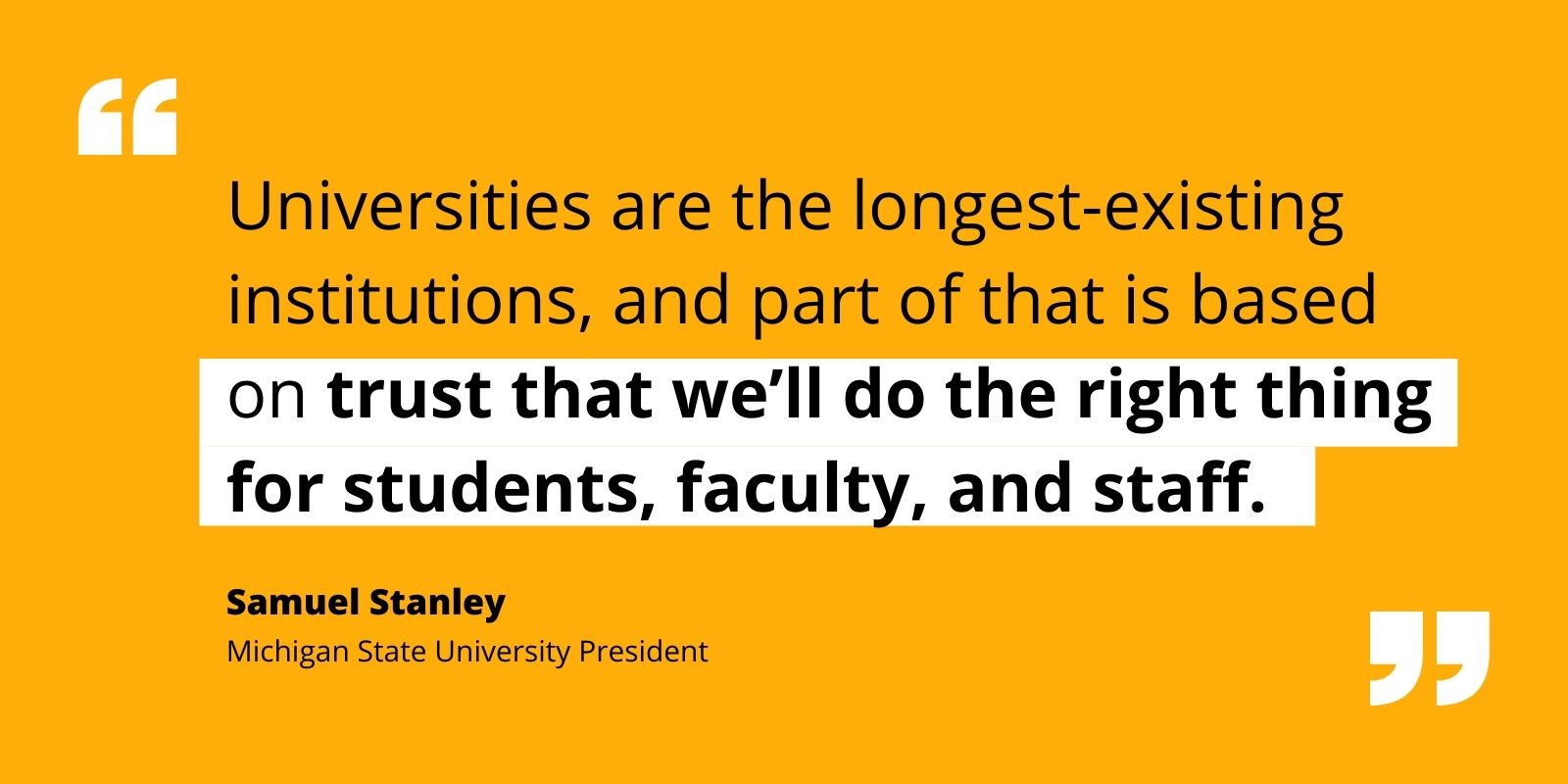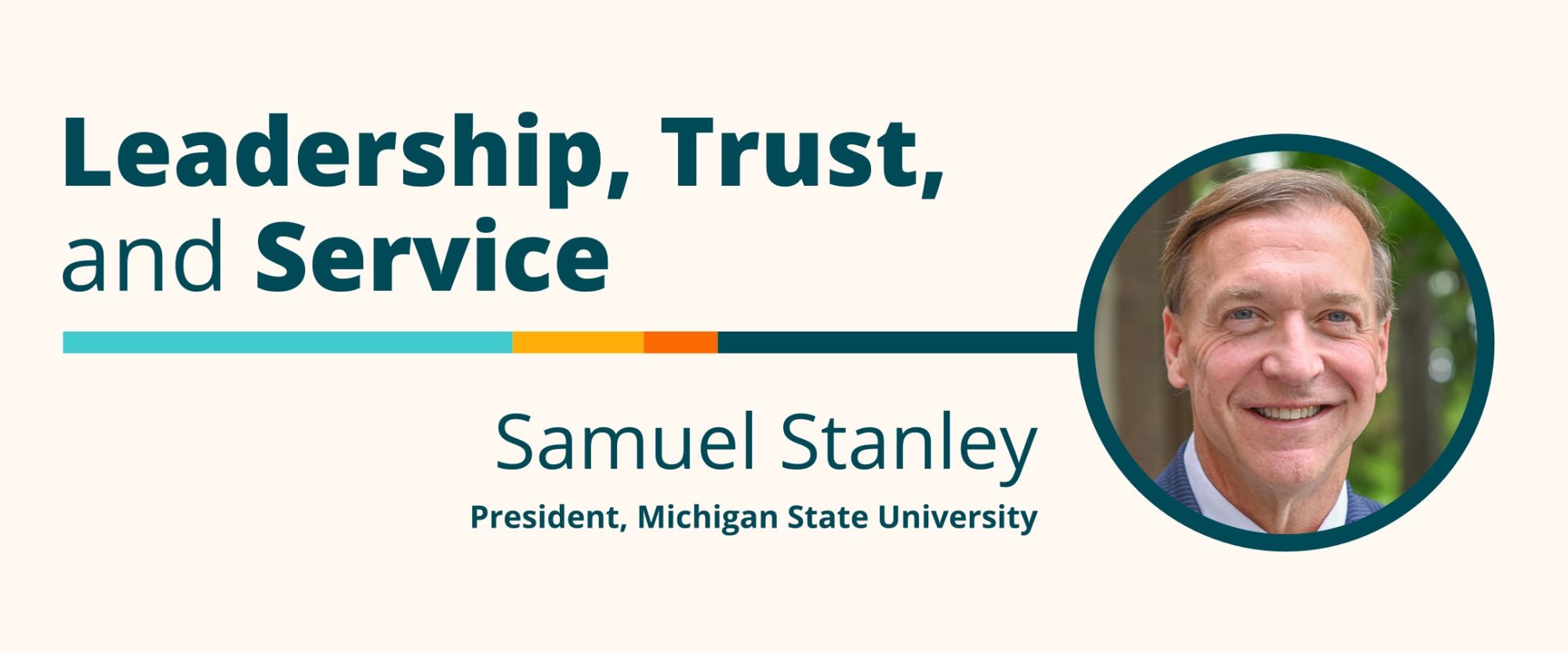Note: This interview in the Weekly Wisdom Series originally aired on May 24, 2021 as part of the University Innovation Alliance’s Innovating Together Podcast, appearing live on Facebook, Twitter, and LinkedIn.
As Executive Director of the University Innovation Alliance (UIA), I'm excited that we're in our second year of the Innovating Together Podcast, created in collaboration with Inside Higher Ed. For the 5/24/21 episode of Innovating Together's Weekly Wisdom Series, I had the honor of speaking with Samuel Stanley, President of Michigan State University. Dr. Stanley was selected to lead M.S.U. out of difficult circumstances, and his high-profile experience with infectious disease research made him the ideal leader in a pandemic year. He generously shared his wisdom about balancing safety and administrative concerns, restoring institutional trust, and the mindset of servant leadership.
Right President, Right Time
Higher ed leaders often rise to institutional leadership through their field of expertise. President Stanley's was infectious disease research, which found him uniquely positioned when COVID-19 came just seven months into his presidency at M.S.U.
"As an infectious disease doctor, I was narrowly focused on treating or preventing a disease," he reflected. "Other concerns were just not part of my life. In this instance, there’s a broader set of concerns: disrupting people’s lives; taking people away from comfort zones of how they’re used to receiving their education. For our faculty, asking them to turn on a dime and go from teaching in person to teaching remotely, without having provided the tools or experience that they would need to do that. I will say I did err on the side of the ultimate goal, safety on campus, and finding ways to preserve and protect that.
"One challenge I think we’ve had with this outbreak is how politicized it’s been," President Stanley observed. "But we tried to do what was right for M.S.U. And I had great support from my board. We talked about it in terms of the safety and long-term reputation of the campus. Universities are some of the longest-existing institutions in the world, and part of that is based on transparency and trust that we’re going to do the right thing for the students, faculty, and staff. So trying to maintain that trust was very important for me during this time. It was really very much a team effort. It was a struggle at times to balance those two components. But I hope we did a good job with the overall."

Restoring Trust
M.S.U.'s Board of Trustees selected President Stanley as the leader to restore confidence after a few turbulent years, an expectation that he strove to honor despite the pandemic's unprecedented distractions.
"Michigan State University has done some amazing things since the ‘60s," he told me. "It’s been on a great set of growth parameters. And I think part of my job was essentially to restore trust in the administration and put us in a place where people felt as though we were really fulfilling our mission as the pioneer land-grant institution, which is to provide access to excellence and do the kind of science research and scholarship that has long-term benefits but is impactful for people in their daily lives."
Regarding the arrival of COVID, he suggested, "I think it gave people the opportunity to see me confront a crisis, how I would keep the university engaged, how I worked with shared governance, how I consulted with students. Hopefully, it was helpful in trying to regain trust. That takes a while to achieve, but I think some of the decisions we made – in terms of putting faculty, students, and staff first – were helpful in people accepting the idea that I was there to help the university."
President Stanley credited his background as a physician for the calm and stability that he projects. "When you’re making decisions as a physician, often it’s potentially life or death," he observed. "In this case, there were elements of life and death in the decisions we were making as university presidents. So I probably had a higher degree of comfort in dealing with uncertainty and the potential high impact of my decisions, and I think that’s one of the things that helps me stay relatively calm. You have to be able to cling to the science and the data you have, and make decisions accordingly, and that’s something I think came from my medical experience."
Not About You
We like hear about the best career advice our guests ever received, and President Stanley's story certainly seems to match his performance as a higher ed servant leader.
"When I was at Washington University in St. Louis, I learned a lot about the importance of building a team, listening to people, and getting input and advice, but then ultimately, having accountability for the decisions that are made and being able to take that responsibility. Larry Shapiro, who was the dean there, talked to me a lot about the decision-making process, and he was very much attuned to transparency. How one gains peoples’ trust and leads without necessarily having all the decision-making power, that was important for me to learn. Because, as president, I don’t tell faculty what to teach. I’m not really their boss. So I think the advice that people gave me was to realize that you occupy the chair in this ongoing institution for a short period of time. 'The job is not about you; the job is about the institution, and you’re the president there to facilitate the institution.'"
I also asked President Stanley what advice he'd give himself if he could go back in time to the start of his own career.
"That’s hard to say," he admitted. "I have mostly positive memories. I think it would have been to set goals earlier in the process, and maybe say, 'You need to change some of your attitudes about what constitutes success.' When I first came to Stony Brook, I had a little bit of the elite university mentality, that one judges a university in the quality of the people that it turns away. That was the operating principle in 2009 when I came in. UIA, A.S.U., and others helped me recognize that was the wrong metric. The correct metric was how many people are you graduating? How many Pell-eligible students are reaching the finish line? What’s the gap in graduation rates between economically disadvantaged students and students who don’t have that barrier? What’s the difference in graduation rates between people of different races and ethnicities? And how do we eliminate those gaps? That was something that would have really been transformational for me three years sooner, I think."
The Leadership Mindset
President Stanley was enjoying his dual career as a physician and teacher – until he had the opportunity to lead the Midwest Regional Center of Excellence for Biodefense and Emerging Infectious Diseases Research.
"When I got that grant," he recalled, "I discovered that administration was a place where one could actually have a very positive impact. And I discovered that other people’s research was sometimes even more interesting than my research. It made me think, 'How do I find ways to encourage that?' So when I applied for and got the job as vice-chancellor for research at Wash U, it really opened up even more how impactful administration was. I never saw myself as an administrator; I saw myself as a faculty member who occasionally was supported and occasionally oppressed by the administration. But I never thought that I would do that for a career. And then becoming a university president – I never was a dean, I never was a provost – was a huge jump."
He believes that his mentors at Washington University gave him the right mindset for leadership, as he shared with me what he told his wife when he accepted the presidency at Stony Brook: "I’ve never been a university president. I think the average life of one is four and a half years. If I get fired, I promise you this, I will get fired for standing up for something I think is right, or for trying to change something I think needs to be changed, and not because I didn’t do things; not because I was just happy to be a caretaker, but because I did things that I think were for the good of the institution."
A Win for the Institution
When I asked President Stanley to describe himself as a leader, he immediately answered, "I really value the people who work for me. Their dedication is extraordinary, and I try and let them know, pretty much every chance I get. The most important thing I’m going to do for Michigan State University is the team I recruited here. I think they’re an outstanding team. And that’s something I emphasize a lot, succession planning at the university.
"I really like to hear people’s opinions," he continued. "I like to listen to what they have to say as I make decisions. I don’t expect blind loyalty – it’s not useful to have people tell me my ideas are great all the time. But at the end of the day, if we make a decision, then I expect people to go along, and I think they understand that. And I try and find pathways for people to advance and grow their responsibilities. I want people at every level at M.S.U. to feel as though 'I have the possibility of moving in my job, and I have to demonstrate I have that capacity in my current position.' I’m never disappointed if someone leaves my university to take a job op. When someone goes from an associate vice president to vice president somewhere else, or from dean to provost, I consider those victories for M.S.U. I had people helping me do that along the way, so I feel it’s very responsible for me to give back on that."
Links Mentioned in This Episode
• Michigan State University
• Land-grant institution
• Washington University in St. Louis
• Stony Brook University
• A.S.U. (Arizona State University, another UIA member institution)
• Midwest Regional Center of Excellence for Biodefense and Emerging Infectious Diseases Research (regional organization supporting the work of the National Institute of Allergy and Infectious Diseases)
Bios of Guest and Host

Guest: Samuel Stanley, President, Michigan State University
Samuel L. Stanley, Jr., M.D., became Michigan State University's 21st president on Aug. 1, 2019, moving decisively to ensure that M.S.U. is a safe, respectful, welcoming place. His top priorities are student success and well-being and growing M.S.U.’s extraordinary regional and global impact. Dr. Stanley's infectious disease research background has informed the university's response to the COVID-19 pandemic. He has overseen changes to improve the institution's services, operations, and accountability. A researcher, patent holder, and former technology transfer executive, Dr. Stanley supports academic and industry collaborations to leverage economic impact and contributions to society. He is a past and active member of numerous regional and national boards. Born in Seattle, he earned a B.A. in biological sciences from the University of Chicago and a medical degree from Harvard. After completing resident-physician training at Massachusetts General Hospital, Dr. Stanley went to Washington University in St. Louis for a School of Medicine fellowship in infectious diseases, becoming a professor of medicine and molecular microbiology. The National Institutes of Health funded his research on enhanced defense against emerging infectious diseases. Prior to becoming M.S.U.’s president, he served as president of Stony Brook University (Long Island, New York), where he focused on improving student success, supported a new institute for artificial intelligence, and chaired the board of Brookhaven Science Associates, which manages Brookhaven National Laboratory on behalf of the U.S. Department of Energy. President Stanley’s wife, Ellen Li, M.D., Ph.D., is a distinguished biomedical researcher and gastroenterologist. Dr. Stanley and Dr. Li have four adult children.

Host: Bridget Burns, Executive Director, University Innovation Alliance
Dr. Bridget Burns is the founding Executive Director of the University Innovation Alliance (UIA). For the past decade, she has advised university presidents, system chancellors, and state and federal policy leaders on strategies to expand access to higher education, address costs, and promote completion for students of all backgrounds. The UIA was developed during Bridget’s tenure as an American Council on Education (A.C.E.) Fellowship at Arizona State University. She held multiple roles within the Oregon University System, including serving as Chief of Staff and Senior Policy Advisor, where she won the national award for innovation in higher education government relations. She was a National Associate for the National Center for Public Policy and Higher Education, and has served on several statewide governing boards including ones governing higher education institutions, financial aid policy, and policy areas impacting children and families.
About Weekly Wisdom
Weekly Wisdom is an event series that happens live on Facebook, Twitter, and LinkedIn. It also becomes a podcast episode. Every week, we join forces with Inside Higher Ed and talk with a sitting college president or chancellor about how they're specifically navigating the challenges of this moment. These conversations will be filled with practicable things you can do right now by unpacking how and why college leaders are making decisions within higher education. Hopefully, these episodes will also leave you with a sense of optimism and a bit of inspiration.
Rate, Review & Subscribe
Learn why hundreds of people have rated this new podcast 5 stars! Please join others and rate and review this podcast. This helps us reach and inform more people -- like you -- to help increase the number of college graduates in the United States.
Click here, scroll to the bottom, tap to rate with five stars, and select “Write a Review.” Then be sure to let us know what you loved most about the episode! Also, if you haven’t done so already, subscribe to the podcast. We’ll be adding a bunch of bonus episodes to the feed and, if you’re not subscribed, there’s a good chance you’ll miss out.

